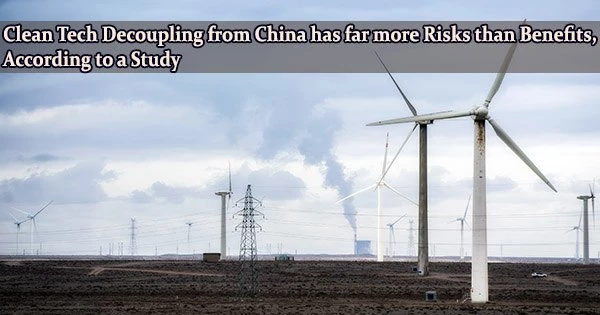According to a recent University of California San Diego study published in Science, the current U.S. trajectory to decouple from China on renewable energy technology could undermine national and international efforts to combat climate change.
The study challenges widespread beliefs that working with China poses significant dangers to both national security and the economy. Three American administrations’ policies as well as the majority of European governments’ policies, such as increased import taxes and increased inspection of scientific collaboration, have been based on these threats.
The study reveals that while some actions may be appropriate, for many technologies, the solution is probably worse than the disease.
“Tackling climate change in the U.S. and especially in the developing world is heavily dependent on having affordable and available low-carbon technologies,” said the study’s lead author Michael Davidson, an assistant professor at UC San Diego’s School of Global Policy and Strategy and at the UC San Diego Jacobs School of Engineering.
“A major benefit of integration is making these technologies more affordable, in addition to increased innovation. Therefore, when throwing up barriers to integration, we need to be objective about the specific policy goals and how they might influence our ability to address the threat of climate change.”
Davidson and his co-authors started the study to look into claims made by officials that working with China on low-carbon technologies could endanger U.S. interests in national security and the economy.
The article breaks down the risks of working together to develop five important CO2 emission-reduction technologies: wind, solar, carbon capture and sequestration (CCS), batteries, and “green” steel. It does this using quantitative and qualitative data.
Our findings reveal national security threats are muted across the various low carbon technologies. For example, open research and development on batteries has been cited as a security concern because batteries can be used for military purposes, but these are not the same batteries that are needed to deal with climate change on a very large scale.
Michael Davidson
“Our findings reveal national security threats are muted across the various low carbon technologies,” said Davidson. “For example, open research and development on batteries has been cited as a security concern because batteries can be used for military purposes, but these are not the same batteries that are needed to deal with climate change on a very large scale.”
The study explains how the large concentration of manufacturing in China poses higher risks of supply chain disruption for solar PV panels and batteries. The paper offers a novel framework that calibrates responses based on conditions particular to industries and technologies to reduce these risks.
For example, the study shows a variety of instances where diversity can achieve the policy goals of decreasing risks, as opposed to a binary option between open and local supply chains.
Job creation has been used as a rationale to reduce trade with China. For example, the Biden administration decided to use the Defense Production Act to increase domestic solar manufacturing, which “will privately benefit the companies, localities, and workers tapped to produce them,” the authors write. They point out that the legislation might result in lower job creation and more emissions if it raises the cost of solar PV and hinders adoption.
The least labor-intensive aspect of the entire project is often the construction of the PV panels. Solar project planning, installation, maintenance, and operation often entail a lot more personnel. Although these professions are challenging to outsource, they are affected when the price of PV rises.
The report evaluates the present level of reliance on China across the various technology components using industry and government data in order to gauge the levels of both economic and national security risk for a given technology.
The study provides in-depth case examples combining quantitative and subjective assessments, which are used to assign a risk level to each category, including job losses, intellectual property violations, supply chain disruptions, critical infrastructure, and more. Because these risks are difficult to quantify, they are included in the study.
“For most technologies, the decoupling ‘cure’ is likely to be worse than the ‘integration’ disease,” the authors write. “There are enormous benefits to having open supply chains and research environments and policies that aim to disrupt that or decouple should be grounded on solid, objective assessment of the risks and rewards.”
The study, “Risks of decoupling from China on low-carbon technologies,” is coauthored by Valerie J. Karplus of Carnegie Mellon University, Joanna I. Lewis of Georgetown University, Jonas Nahm of Johns Hopkins University and Alex Wang of the University of California, Los Angeles.
















